- Home
- Robert Graves
The Islands of Unwisdom Page 5
The Islands of Unwisdom Read online
Page 5
The General groaned and wrung his hands. ‘Brothers,’ he said, ‘you do not know what you are asking. The Colonel has been appointed by the Viceroy, and I can no more dismiss him than I could tear up my letters patent. If we take any action against him, his cousin the Warden of Callao will hear of it at once and order the dock-masters to delay our taking in of stores; and even if we were foolish enough to leave without these, we might find on our arrival at Paita that the news had outrun us and that we were denied the eighty arquebuses which the Lieutenant of the port is to supply. Calm yourselves, I implore you! Pedro Fernandez, my friend, you are a reasonable man and must be aware that it is I, not the Colonel, who commands this expedition. I pledge you my word of honour that if you consent to stay, suitable remedies will be applied.’
But Father Antonio was still waiting with his complaint about the cabin, joined with a request for a postponement of the sailing. The General commiserated with him and said that, though he could neither enlarge the ship nor redistribute the quarters, yet when the Isles were reached, he would give the Vicar every facility for the erection of a splendid church and vicarage, which should take precedence of all other building whatsoever. He even agreed to send a messenger to the Viceroy asking leave to postpone the departure, though he held out no hope of a favourable reply.
That night Juarez Mendés and Matia Pineto, two gaunt old soldiers, were on guard outside the Great Cabin, and keeping them company was Jaume Bonet, the water-steward. These three formed a close junta, since they were the only men in the ship—except for the General and his negro Myn—who had been on the previous voyage when the Isles of Solomon were discovered. They sat cross-legged in the alley-way, playing a desultory game of cards, and drinking chicha; but most of the time they were recalling events in which they had taken part and commenting on their new ship-mates. The General and Doña Ysabel slept ashore, and the Chief Pilot was also away, attending to his sick wife; whether the junta were unaware that I lay close by in the Chart-room, hearing every word they said, or whether they knew and did not care, I cannot tell. I strained my ears to listen, because they were men who knew much but were not free with their opinions except when in drink.
I heard Juarez ask: ‘What is your venture, Matia?’
‘Chisels, knives, razors, needles and suchlike; fifteen pesos’ worth: a pedlar’s stock that I bought up-country a month ago.’
‘Bought!’ exclaimed Juarez, in tones of disbelief.
‘With a soldier’s prayer and blessing, not to mention the bull’s pizzle with which I dusted his clothes for him. The savages will pay me a whole pig for a single needle. One of these days you’ll see me surrounded by pigs, like the Prodigal Son, but with a plumper paunch. As for every chisel, a sackful of gold nuggets: that’s my price. What’s your venture, mutton-vender?’
‘Thirty yards of arquebus match, borrowed from the Royal Arsenal by a friend to whom I have bequeathed my sweetheart.’
‘What use will the savages have for wick, unless you also sell them your piece and powder-horn, which you’d never do?’
‘Blockhead, the match isn’t for them! Our first expedition, though far better supplied than this one, failed for want of match. In those islands a man’s life depends on keeping his match alight; and mark my words, Matia, the time will come when you’ll be ready to barter all your black pigs, and your sacks of nuggets too, against a span of wick.’
‘I’d strangle you with it first, you Jew. But Juarez, do you recall that day on Malaita when the Indians attacked us, and I dropped that old man with the grey corded hair? God’s passion, how the bastard fought, though all the rest had fled when we opened fire! Jaume, you should have seen him! There he stood, with a great gash in his thigh, facing us all alone with his spear and shield. Four of our targeteers went for him, but he defended himself like a devil, dealing terrific thrusts at their targes with the miserable spear which, had it been steel-tipped, would have pierced them through and through, and warding off their sword-strokes with his wooden shield, until they hacked it into fifty pieces. And even when we’d given him a couple of good cuts on the shoulders, and a stab in the side, the black devil fought on until I settled him with a blow that nearly split his skull and felled him to the ground, and what was left of his spear dropped from his hand.’
‘Will I ever forget it?’ said Juarez. ‘Don Hernando Enriquez ordered us to do him no more harm, and though he was dying, yet he tried to rise, with the blood pouring in streams from his face, and groped for the remnant of his spear, but could not find it and sank down again. Nor will I forget your face, Matia, when presently you ventured close and he shot you such a venomous look that you jumped back three paces; and tried once more to lift himself up against you, but could not, and plucked a handful of grass and flung that…. It’s only with fire-arms that these heathen can be controlled. I still say that my wick is the best venture.’
‘Jaume,’ said Juarez presently, ‘you look glum tonight. Another cup, man, and tell us what you think of this ship and her company.’
A pause, while Jaume drank, then he pronounced slowly: ‘In my opinion, old cocks, the San Geronimo is pretty well; as good as any Peruvian-built ship in which I’ve sailed, though they’re all clumsy in rough weather, and don’t take it kindly when you work them to windward. She came off the stocks at Guayaquil no more than two years ago, and I’ve seen the Chief Pilot go over her from bowsprit to lantern and from keel to masthead, warranting her to be sound. You can trust that man; a Lisbon wharf-rat and a seaman to his finger-tips, yet with more breeding than many a marquis. The crew’s pretty well too, on the whole; and as for Don Marcos Marin—I never served under a better boatswain. What more remains to be said?’
‘A great deal more, Jaume. On our last voyage we hadn’t a single skirt in the fleet, except when we kidnapped those five savages just before our return; and then the General locked them up below, giving the key of their quarters to Fray Francisco. But what have we now? This ship might be a floating brothel, and I’m told and well believe it, that fully half the girls have earned their living that way. Where there are skirts, there’s trouble, I say. For who can control them? Not even the priests. Nor even God Himself.’
‘As to that, I’ve no fears. The General’s Lady has a cold blue eye, to exact obedience, and her maid Elvira tells me that if the least breath of scandal comes to her ears, she’s capable of having the slut whipped well-nigh to death and the poor fornicator keelhauled. It takes a skirt to manage skirts, and the General’s Lady is a tiger, if ever I saw one. Let any man who crosses her path beware; for my part, I’ve learned to doff my cap from half a league away when I see her approach, and remain frozen in a respectful posture for half an hour after she’s passed.’
‘How in the world did the General come to marry her?’
‘She came out from Spain as companion to the Viceroy’s Lady in the same ship as himself—she’s a daughter of Don Francisco de Barreto, a Governor of Angola who died, they say, searching for gold in the mountains of Africa. The gold-fly seems to have bitten Doña Ysabel too, and her greed matches her courage; Elvira says that she often dreams of bathing in rivers of gold like the King of Bogotá. When she heard of Don Alvaro’s letters patent, she very soon had her hook in his gills. It’s my opinion that but for her the General would have been satisfied with his early laurels and spent the rest of his life on his estate at Guanaco. And this I know: she’s used her interest with the Viceroy’s Lady to get the expedition under way at last, forcing the old man to sell or mortgage all his worldly goods to equip it, and herself recruiting the merchant-venturers to make up what was lacking. Your deal, Matia, but remember old friendship. Your hands move a little too fast for my liking.’
‘Come, Jaume, you know I’d never skin you! Indeed, I swear I love you so well, you whoremaster of Majorca, that if you’ll pay me only half a peso, I’ll teach you the whole art of dealing. After three days I warrant to make you an adept, and you’ll never want again for the remainder of your lif
e.’
Jaume grunted doubtfully, but Juarez said: ‘Why grunt like a pig, man? It’s a generous offer. Matia’s the world’s best artist in rigging a deck. Primero’s his specialty, and I’m his faithful acolyte. Half a peso, sailor, it’s nothing; and for that he’ll teach you how to take a quick peep at the lowest card, how to shuffle it where it’s of the greatest use, and then deal yourself a certainty. The trick is to give your partner fifty-two points, and then palm an ace to make fifty-five yourself or, if you like, deal yourself a neat fifty-four, so that you win either on the hand or on points. And another half-peso for myself, Jaume, and I’ll teach you how to draw three cards and throw only two without fear of discovery. Whenever Matia and I play together—except, of course, with an old ship-mate like you—we play into each other’s hands like a couple of friars, and share the profits. How we rig the deck is this: one of us either takes up good cards already thrown and slips them on top of the pack for his partner to draw, or changes it for a doctored pack while his partner raises a distraction. It’s easy pickings, sailor. Come in with us; we need a third.’
‘I wonder that, with your mastery of the art, you can bring yourselves to play a straight game with me.’
‘Why, Jaume, you might as well wonder that, being soldiers by profession, we don’t ransack the homes of our nearest relatives.’
‘Yes, you’re right there, Juarez. I might as well wonder, knowing the reputation you built up in the late bloody rebellion.’
The soldiers laughed uproariously and, as the chicha went round again, returned to their discussion of the General. Matia asked: ‘And what do you think of him, Jaume? According to Juarez he isn’t by any means the man he was when we knew him; but why say that? He’s half a century older, I grant, but so are you, and so am I. I don’t know how it is with you fellows, but though I’m a trifle slower on my legs and more easily winded, I’m quicker on the mark with my arquebus; and though less indefatigable in my pursuit of skirts, yet I can deal with them when I catch them as well as ever I did, or better; and if I haven’t learned wisdom, I’ve learned at least to avoid the appearance of folly. Am I to believe that the General has lost more and gained less in these years than I have?’
‘As to that,’ said Jaume, ‘Elvira tells me that he’s taken a vow of chastity for the length of the voyage, and that he’s tried to persuade Don Juan de la Isla, and the Captain of Artillery, and the other married men to do the same. Piety is his pretext, but from what Elvira says, who’s as deep in her mistress’s confidence as I’m in hers, the General who once had a splendid reputation as a gallant has failed for years to give his Lady the tender attentions which are her due; and this may well be the reason for her restlessness and violent ill-temper—any fool can see by her gait and figure that she’s a full-blooded woman and, if I may believe Elvira, she’s never yet taken a lover, though many a nobleman has strained his guts in an attempt to seduce her. In my opinion, the General is already senile; the sap has ceased to mount and the leaves are falling. I only hope that the courage and resolution which he displayed when we first knew him haven’t yet altogether deserted him.’
‘I say amen to that,’ said Juarez. ‘But I’ve known him off and on during the intervening years, and it’s my belief that he’s never been the same since that affair at Panama. I don’t think you know the story. Well, when he made his first attempt to set this expedition on foot, some twenty years ago now, he passed through Panama on his way here, with the volunteers he’d enlisted in Spain, myself among them. At the quay, when we’d disembarked, a bilious customs-clerk confiscated my sea-chest, pretending to find contraband in it. You know me; I called him a rogue and a robber and offered to break his teeth with the butt of my arquebus. At once the Inspector had me arrested, and all my comrades ran to the city to complain to the President—who proved to be an abominable cockroach by name Dr. Loarte.’
‘Loarte? That would be the gentleman who seduced his stepdaughter to prevent her from marrying and taking her fortune away with her.’
‘I can well believe it; the gallows were marked all over his face. He not only supported the Inspector, who supported the clerk, but sent troops to arrest the General as leader of the riot; and then in compliment to the General’s uncle, whom he hated for what he’d written against him as a member of the Indies Council, had him marched off to the common jail (where I was already confined) to lie among stinking negroes and poxy Indians. The people of the port sided with us, so far as they dared, and showed their detestation of that insect in a ruff, the President; but stood in fear of the Supreme Court which he controlled. Only one man came forward to plead his case, this same Juan de la Isla, who persuaded Dr. Loarte that to jail a high-born Spaniard with a Royal Commission in his pocket was to affront King Philip himself; so presently he was removed to the Town Hall, where Don Juan placed his purse at the General’s disposal—everything he owned having been confiscated—and a week later we were both set free to continue our journey. Well, I hold that something in the General’s soul, some airy creature of great merit, was mortally wounded in that jail; and that after lingering a few years in the unkind airs of Peru, it perished. I believe, in fact, and Jaume here has confirmed my belief, that though the General may play his part as leader of this expedition with dignity and courage, he walks already like one who treads his destined road to the grave or to the gallows. What drives him is not his own will, but the will of Doña Ysabel; who, when they step ashore on the Isles and take possession, will become a great land-owner and strut about in golden slippers. I’m heartily sorry for her serfs and her tenants. The chicha, Jaume! These things don’t bear reflexion.’
His comrades did not seem to be paying much attention. ‘No, no, Jaume, not that way,’ scolded Matia. ‘You’re all thumbs, sailor. Let me show you again how to juggle the top-cards.’
‘My fingers are too old and too well set in honesty to learn a thieves’ trade now,’ Jaume grumbled.
‘And that’s no way to palm an ace, man! You knocked on every door in turn, like the Vicar’s Chaplain.’
Chapter 4
DEPARTURE FROM CALLAO
I shall never forget our labours and vexations of the Thursday, the last full day left us for taking in stores. We were now short-handed: fifteen of the seamen signed on for the voyage had deserted during the night, no doubt because the violent altercation between the Colonel and the Chief Pilot decided them—and I began to be of their opinion myself—that this was no ship in which to sail to the unknown ends of the world. Moreover, Don Gaspar Iturbe the Purser found to his disgust that though our list of stores was an imposing one, ample for six months or more, and included a multiplicity of items, such as saws, hatchets, spades, mattocks and a portable forge, needed for the building of a settlement; not to speak of bells, looking-glasses, beads, coloured kerchiefs, silken caps, German knives and other toys prized by savages; yet only two-thirds of the victuals and less than one-third of the tools and trade goods had so far been delivered. When he went to remonstrate with the contractors, he found that the General had not been able to lay down sufficient money to secure the remainder, and that they had no confidence in his notes of hand despite their Royal backing. Four out of every five expeditions to the South Seas miscarried, and though they could present their claims to the Treasury, it might be years before these were met; they had therefore promised, but not performed.
In effect, though the General had paid for the San Geronimo and contributed towards the purchase of two other vessels by mortgaging the income of his estate; and also contrived to buy some toys for the Indians, a few cattle to stock the Isles, and equipment for the smelting of precious metals, there he had stopped. He required all the pilots to provide their own nautical instruments and even to lend him money for the purchase of spare sails, spars and cordage; as for the pay of the sailors and soldiers, that would be found by the Treasury, except in the case of some fifty volunteers who served on the understanding that they would be granted estates in the Isles.
&n
bsp; The Purser warned me not to tell a soul of the General’s failure to lay down his share of the venture; to do so would not only lessen his authority with the ship’s company but greatly displease our merchant-venturers, who did not yet know either that they had been left to bear the whole cost of victualling the flagship, or that important stores were still lacking. ‘Let us be just,’ said Don Gaspar, ‘and admit that the fault does not lie wholly with him. Twenty years ago at his own expense he brought out a galleon from Corunna laden with merchandise and volunteers; but the President of Panama and the Viceroy of Peru combined against him, so that he had to sell the goods at great loss, besides paying off his volunteers, and has been in debt ever since. I cannot find it in my heart to blame Don Alvaro.’
I promised to keep silence, but when I saw how lavishly the General’s own larder was being stocked with oil, dried meats, bladders of lard, barrels of Malmsey and Madeira wine, jars of honey, boxes of quince conserve, sacks of white flour and the like, I began to wonder. And when Doña Ysabel came on board that evening, in a stiffly brocaded silk dress with diamond buttons, flaunting a golden bracelet closely set with fine emeralds each the size of your thumb-nail, a necklace of the same design and a ruby ring on her little finger worth ten thousand pesos at the least, besides costly ear-rings and other jewels, I grew indignant. ‘Don Gaspar,’ I said to the Purser, ‘the General’s Lady should be ashamed to display riches that might have been pledged to buy much needed stores.’
‘Hush, man!’ he answered. ‘She inherited those jewels from her mother and, as anyone with experience of the world will tell you, once a noblewoman begins to pledge her jewels, or allows her husband to do so for her, she loses pride and pleasure in life and sees herself already in rags, begging on the Cathedral steps. The General would never even hint that they should be sacrificed; besides, they have served us well. Doña Ysabel has succeeded in stocking her husband’s wants at no cost either to herself or to him; because many of the rich Andalusians of Lima, though you might not think it, are men of chivalrous sentiments, which is to say, fools. When a lady of birth and beauty walks into a counting-house and confidently hands the merchant a long list of goods for the Great Cabin of the ship in which she and her husband are sailing to the South Seas in search of gold and pearls, and does not haggle, but merely stipulates immediate delivery, what then, man? Why, he agrees as if in a trance, dazzled by her smile and condescension, accepts her note of hand without a qualm, and never pauses to notice that the date of payment is not specified. He fulfils the order because it would go against his honour to retreat from his word—did she not address him as “my lord”?—and afterwards quiets his mercantile conscience with: “I can be sure of seeing my money again. She was wearing jewellery worth forty thousand pesos, and the goods are for herself, which makes her debt one of honour.” All the same, he is hardly fool enough to show the note of hand to his wife, who would surely skin him alive if she knew what he’d done.

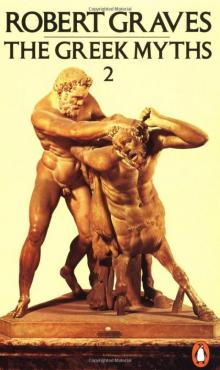 The Greek Myths, Volume2
The Greek Myths, Volume2 The Anger of Achilles: Homer's Iliad
The Anger of Achilles: Homer's Iliad Count Belisarius
Count Belisarius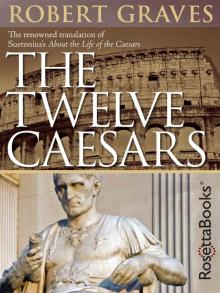 The Twelve Caesars
The Twelve Caesars Complete Poems 3 (Robert Graves Programme)
Complete Poems 3 (Robert Graves Programme) Homer's Daughter
Homer's Daughter The White Goddess
The White Goddess Goodbye to All That
Goodbye to All That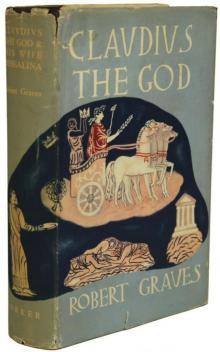 Claudius the God and His Wife Messalina
Claudius the God and His Wife Messalina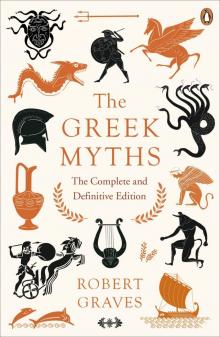 The Greek Myths
The Greek Myths I, Claudius
I, Claudius The Islands of Unwisdom
The Islands of Unwisdom Complete Short Stories
Complete Short Stories The Golden Fleece
The Golden Fleece They Hanged My Saintly Billy
They Hanged My Saintly Billy King Jesus
King Jesus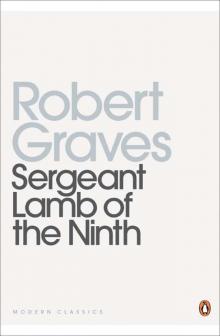 Sergeant Lamb's America
Sergeant Lamb's America Hebrew Myths: The Book of Genesis
Hebrew Myths: The Book of Genesis Seven Days in New Crete
Seven Days in New Crete Proceed, Sergeant Lamb
Proceed, Sergeant Lamb Claudius the God
Claudius the God Wife to Mr. Milton
Wife to Mr. Milton The Complete Poems
The Complete Poems The Anger of Achilles
The Anger of Achilles Claudius the God c-2
Claudius the God c-2 Hebrew Myths
Hebrew Myths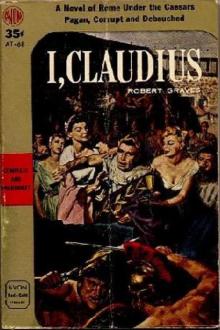 I, Claudius c-1
I, Claudius c-1 The Greek Myths, Volume 1
The Greek Myths, Volume 1